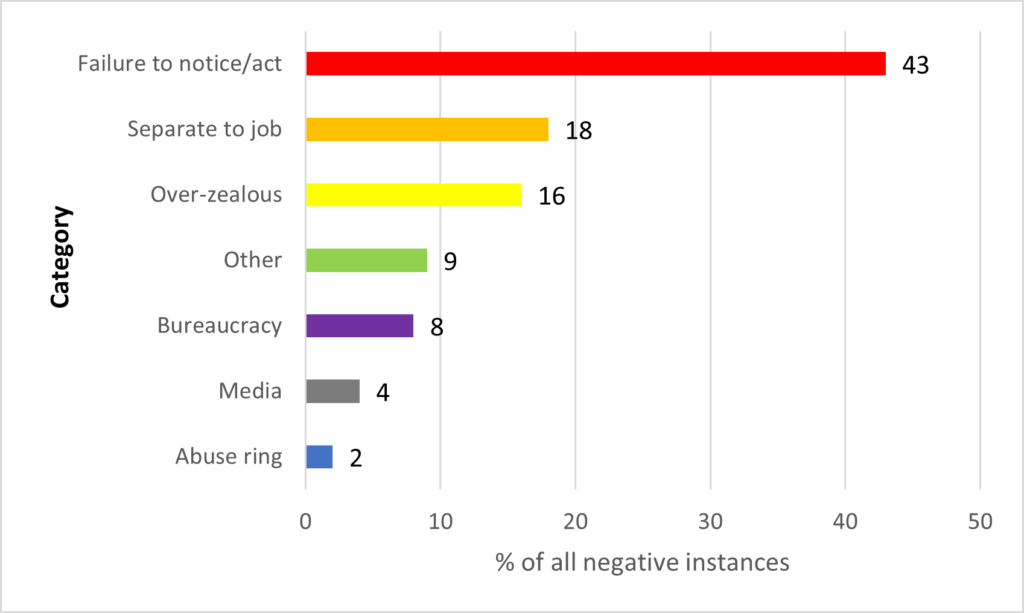
By Maria Leedham
‘Hostile media coverage’
‘Blame culture’
Social workers as ‘cultural scapegoats’ or ‘child snatchers’.
These are just some of the claims made about how social workers are portrayed in the media. But is the media really so negative about social workers? And what does this negativity look like?
Four times as many negative stories as positive ones
I set out to research the language surrounding the profession of social work in the media by carrying out two studies. In the first study, I looked at over 700 UK national newspaper articles which mentioned ‘social worker’, published in a 3-month period in the middle of 2019. I then read and classified each one as a ‘neutral’, ‘positive’ or ‘negative’ portrayal of the social worker.
The first finding was that – as other studies have found – child protection dominates in newspaper articles with adult care hardly getting a look in. And it’s probably no surprise that there were four times as many negative hits as positive ones (25% negative to 6% positive). Let’s look at some of the negative examples:
Both men had histories of domestic violence, crime and drug use, yet social workers dismissed concerns and did not intervene. [The Daily Telegraph, 07/06/19]
COUNTY LINES THUGS LURE 25 FROM UNDER NOSES OF TEACHERS AND SOCIAL WORKERS [The Daily Mail, 15/05/19]
In these and many other examples, the social worker is blamed for a perceived failure to anticipate a child protection issue. Not noticing or acting seems to be claimed far more than the over-zealous removal of children or simply being an unwanted presence:
They are asking local council social workers to think harder before bringing cases about taking children into care to court. [Mail Online, 04/07/19]
a social worker turned up at Amber’s house to watch her for hours each day. [Mail Online, 20/06/19]
The bar chart below starkly shows how press articles are more about what social workers didn’t do or notice (43%) than about them acting too quickly (16%).
 An important caveat here is that the information in the public domain is skewed in that child deaths are widely known about and reported on, whereas the removal of children is not public information as the press are excluded from family courts (I am grateful to social worker Vicki Ayris for this point).
An important caveat here is that the information in the public domain is skewed in that child deaths are widely known about and reported on, whereas the removal of children is not public information as the press are excluded from family courts (I am grateful to social worker Vicki Ayris for this point).
Sometimes being a social worker didn’t seem to be relevant to the story at all (18% of instances):
And now, the social worker shares her bed with two men and a woman, with Amelia’s children even calling her girlfriend their ‘other mother’. [Daily Mail, 14/06/19]
Of course, there’s a bias in the news towards reporting negative stories rather than positive ones. Social workers are in the news when there’s a problem, and where a case goes wrong there’s a culture of looking for an individual person or an individual agency to hold accountable. But is the entertainment media any different?
Plot device in TV dramas
The second study focused on how social workers are portrayed in TV dramas and compared this with portrayals of other professions such as nurses, teachers, police officers and therapists. I looked at IMDb plot summaries from the 1950s to the 2010s and found that social work characters rarely feature.
When they do, it’s usually as a plot device for a single episode. Once the storyline is resolved, the character disappears.
When they do appear, social workers are described as either judgmental bureaucrats or child snatchers. And they’re almost always working in child protection.
With two visits a month, supervised by a social worker who sees you as the enemy? [How to Get Away with murder, 2016]
And there’s a social worker downstairs waiting to take Ethan away. [Grey’s Anatomy, 2013]
When I compared social workers with other female-dominated professions, such as nannying or nursing, I found that these characters were often referred to in terms of how they looked or whether they were sexually available:
If she was my social worker, I’d be calling her three times a night too. [Law and Order, 2010]
Or was it about him seducing the nanny? [Reign, 2015]
It seems that for TV scriptwriters these characters are viewed as female first and professional second.
A way forward
It’s not all doom and gloom, however. Recently some good initiatives have emerged to encourage a broader range of news interest in the profession.
The BASW Social Work Journalism Awards were launched in 2023 and complement the Social Workers Union guidelines on media reporting in social work. The awards are a yearly event with prizewinners announced at the BASW conference.
There’s also the Transparency Project which aims to make family court reporting clearer.
What we really need now is a soap opera with a social worker as a main character to move TV dramas on from the child catcher-as-plot-device trope!
Dr Maria Leedham is senior lecturer in applied linguistics and English language at the Open University, and a forthcoming guest on a Community Care podcast episode about negative media coverage.
More from Choose Social Work
- ‘We never hear about the children social workers help’: a day in the life of a social work team
- ‘It was wonderful to have somebody show me they really cared’
- When social work becomes a family affair
- ‘The advice that has stayed with me through my social work career’
- ‘You can literally change a young person’s life’: an 18-year-old’s message for social workers
- ‘What I wish I’d known before becoming a social worker’





 Family help: one local authority’s experience of the model
Family help: one local authority’s experience of the model  ‘I spent the first three months listening’: how supportive leadership can transform children’s services
‘I spent the first three months listening’: how supportive leadership can transform children’s services  How senior leaders in one authority maintain a culture of excellence
How senior leaders in one authority maintain a culture of excellence  How staff support ensures fantastic outcomes for children and families
How staff support ensures fantastic outcomes for children and families  Workforce Insights – showcasing a selection of the sector’s top recruiters
Workforce Insights – showcasing a selection of the sector’s top recruiters 

 Facebook
Facebook X
X LinkedIn
LinkedIn Instagram
Instagram
I have been a social worker for about 20 years and it has been such a negative experience especially the system and management. But working with families have been quite positive experience. Because I work in a relational way with the families it has been positive.
But the reality about social worker is having to meet deadlines. None of the social workers I met have been able to be on top of deadlines.
We have become part of the system where performance matters most.
I recently left.a job and the 11 year old girl was so upset saying I was the best and the longest social worker the family had.
When I did my last visit she was waiting to show off her new high school uniform.
I left there with a tear in my eye, and although I was exhausted and feeling burnt out I felt happy as I was bright spark in the families life.
We social workers are working hard, sitting up nights writing notes and reports
We are most resilient beings, having to support others and dealing with your own family and issues.
I love being a social worker.
It’s time that society as a whole as to the actual job of social workers. Let’s get away from this view last to act, first to blame.
If social work was an outward looking profession with confident and proactive leadership the picture would be very different. Internal monologues and endless draft policies with the occasional nod to the actual world is hardly going to make for a positive public image. There is zero chance of an interesting character plot for a drama when 98% of social work is sitting Infront of an outdated pc trying to fill in forms that bear no relation to actual social work.
Another area that might be worth a study – although it won’t be easy – is where the TV programs have plot lines where Social Workers should appear but don’t. In Holby City, for example, the Doctors did the child protection investigations and the patients discharged themselves and I’m not sure The Bill ever used an Appropriate Adult.
I have recently gone off sick due to stress in all areas of life. Feeling that I can not meet the needs of the children, my family my own needs. I feel that the process is so focused on the parents needs in that of referrals… chasing their progress to evidence in court. That the children are completely lost. We are criticised for not supporting families. When in fact a parent should evidence to a court that they are capable of making such referrals to evidence a commitment to change then sustain those changes. Yet with a case load of over 30+ it is just not possible for us to be the parent. On top of the forms… visits.. meetings.. recordings.. last minute supervision s, placement moves, unregulated placements when there are no regulated placements.. answering before a court to evidence what we have done to source a regulated placement.. whilst setting up.payments… visiting unregulated weekly, votc… begging for money for support for the families at risk.of becoming LAC but met with deaf ears…
My family life is broken… I am broken.. I can not think.. I am blank.. emotionally and physically….
Hi Maria
I liked your piece and I have referenced it already in a chapter for a book I’m writing. Can I query your title – should it be ‘How the media create negative perceptions of social workers? I feel that they are the source of the negative perceptions. I covered some ideas for changing perceptions in my book and if you are ever looking at how to change perceptions I’d be happy to join up. Best Wishes Sharon
Hi Sharon,
Thank you! and that’s good to hear re the reference.
CC changed the title – my original title was: ‘Social workers dismissed concerns’ – has the media still got it in for social workers?
I think, given your feedback, I’ll ask if this can be reinstated.
This CC article is based on a published piece here: https://academic.oup.com/bjsw/article/52/2/1110/6279240
and an article under review (conference presentation with slides available here: https://oro.open.ac.uk/87164/)
I’m up for collaborating if there’s something here I can offer. My work email is maria.leedham@open.ac.uk
best wishes, Maria
After discussion (and letting Maria know) we’ve decided not to change the headline. My original reasoning for changing this was that the phrase ‘got it in for’ assigns a deliberate intention on the part of the media to vilify social workers, which I didn’t think was substantiated by the article itself.
We prefer not to change headlines after publication when we can avoid doing so, as it can be confusing for readers.
Thanks,
Ruth – head of content at Community Care
Hi Sharon,
I completely agree, I think this is the crux of the issue…
I cannot fathom why the social care sector is betrayed and vilified by the media in such an overt manner.
I would be more than happy to support any movement that puts social work on its own map, rather than the ancillary efforts of our media today.
The public are unaware and disengaged from the vital roles we play in people’s lives under the economic and political constraints we do.
I’m personally fed up of being the poor relation to the NHS, when infact I think we are the richest sector of generic knowledge and expertise that actually can make the difference. But totally misunderstood.
This is exactly the discussion I had with a friend a while ago. I’m a newly qualified Social Worker and I’m in awe of what we do. But it’s never looked at or praised especially in the media. And if it is looked at it it’s always within child protection. Adults don’t get a look in, it’s like society just think we work with children. There is not much of a mention of the complexities of supporting vulnerable adults it’s heartbreaking.
Until the narrative is changed by the media and in society as a whole, how we are perceived will not change. The pressure now put on the ‘Nanny state’ is incredibly high and its that perception of what this means, instead of the state intervenes to protect from, we are now protecting people from the state due to policies put in place to deprive. I work in a Learning Disability team and the lack of resources and staff has pushed the cost of existing services through the roof and with waiting lists and safeguarding people, the lack of social workers makes the work challenging due to how we are portrayed on tv and books, child snatcher and putting older people into care, we are losing the workforce. 4000 social work students per year, yet they leave after 2 years or dont complete due to placement breakdown, due to poor supervision and lack of care. This is now such a stressy job, high burn out rates, all out performance,poor management and supervision, a lack of vision who would want to be a social worker!! I do but its hard, its time more thought and care and actually asking us what we would like to see being portrayed. Instead of endless programmes about the NHS lets see honest programmes about Social worker in all areas.